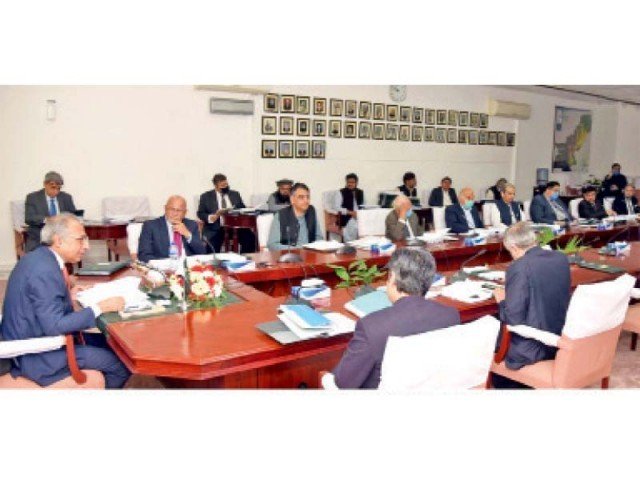Pakistan Govt Approves 6 Projects Costing Rs. 98 billion
Islamabad: The federal government on Thursday approved six projects at a cost of Rs98 billion, of which four of them had been revised repeatedly, underscoring poor planning, approval and execution of projects that was denying the intended benefits besides putting additional burden on the public exchequer.
Adviser to Prime Minister on Finance Dr Abdul Hafeez Shaikh chaired the meeting of the Executive Committee of National Economic Council (Ecnec) that approved the six schemes costing Rs97.6 billion, according to a statement issued by the Ministry of Finance.
However, four projects that were approved at a total cost of Rs27.7 billion about a decade ago, have now been given the go-ahead again at a cumulative cost of Rs61.3 billion, an increase of at least Rs33.6 billion, which is more than double the original cost. A project for the construction of Mandra-Chakwal road had been approved by Ecnec, led by Abdul Hafeez Shaikh, at a cost of Rs2.7 billion in 2012. Shaikh has now approved it at a revised cost of Rs11.9 billion, which was 348% higher.
Project planning and execution has remained dismal in Pakistan and successive governments have failed to improve the system, resulting in wastage of fiscal resources. No one has been penalised for the ill-planning, approval and execution of the schemes. The Mandra-Chakwal project had been pushed forward by the then prime minister, Raja Pervaiz Ashraf, for his constituency. The scheme was challenged in court due to violation of rules in the award of contracts.
Also Read: Geological Survey Of Pakistan (GSP) To Establish, Strengthen Research Labs In KP
The National Accountability Bureau (NAB) had also launched an inquiry. The Central Development Working Party (CDWP) initially approved the scheme in September 2012 at a cost of Rs2.7 billion. However, after coming to power, the Pakistan Muslim League-Nawaz (PML-N) government approved the project at a revised cost of Rs4.7 billion and then again adjusted the cost upwards to Rs10.1 billion in 2016.
Former PM Ashraf gave the contract to the National Logistics Cell (NLC) in violation of the Public Procurement Regulatory Authority (PPRA) rules. The Islamabad High Court later struck down the award of the contract. However, in competitive bidding, NLC again won the contract by offering the lowest bid.
Now, the Pakistan Tehreek-e-Insaf (PTI) government has made a third revision, increasing the cost by Rs9.2 billion – 348% higher than the original cost in 2012. Ecnec also approved the Toiwar/Batozai Storage Dam project for Killa Saifullah district, Balochistan at the second-time revised cost of Rs4.9 billion. This project had been initially approved at a cost of Rs2.4 billion.
The Irrigation Department of Balochistan will execute the project. Ecnec directed the government of Balochistan to ensure the completion of the project within the revised scope and cost. The Naulong Dam project, with the PC-I revised for the second time, was granted, in principle, approval to enable the Economic Affairs Division to start negotiations with the Asian Development Bank for finalising details of project financing, according to the Ministry of Finance. The cost of the Naulong Dam has been increased from Rs11.7 billion in 2009 to Rs28.47 billion.
Ecnec also gave directives for constituting a committee comprising the minister for economic affairs, minister for planning, Privatisation Commission deputy chairman, representatives of the Ministry of Water Resources and the government of Balochistan to discuss issues related to the preparation of revised PC-I of the project. The committee will give its input within two weeks.
The total cultivable command area of the project has been increased from the earlier proposed 9,900 acres to 47,000 acres while the proposed power generation capacity of the project has also been raised. The technical appraisal section has asked several questions about the hydrology and seismic data of the area where the Naulong Dam is under construction. Ecnec also approved the operationalisation of Green Line Bus Rapid Transit and Installation of Integrated Intelligent Transport System Equipment project at a total cost of Rs11 billion.
It endorsed the construction of National Electronic Complex of Pakistan, Phase-I in the H-9/1 sector of Islamabad at a revised cost of Rs16.1 billion. This project had been approved at a cost of Rs10.9 billion many years ago.
The project will help in technology acquisition for the achievement of self-reliance in research, design and manufacturing in the information and communication technology sector. It will also help give early warning systems for disaster management and aid in electronic measures for the security of national assets, electronic exploration of natural resources on land/ sea and designing and fabrication of integrated circuits and systems on chips. It is expected that the project will be completed by June 2022.
The National Programme for Enhancing the Command Area in Barani Areas of Pakistan was approved at a total cost of Rs25.4 billion. The project scope includes construction of 2,664 farm ponds for storing rainwater from various sources and installation of solar pumping systems on farm ponds for the operation of high-efficiency irrigation systems.

